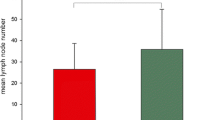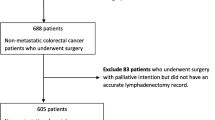Abstract
PURPOSE: The aim was to investigate the significance of lymph node micrometastases in Dukes Stages A and B colorectal cancer. METHODS: Archival specimens were examined from 147 patients (96 colon, 51 rectum; 44 Stage A, 103 Stage B) who had surgery between 1987 and 1994. One lymph node section from each node (colon, 1–11; median, 4; rectum, 1–15; median, 3) was examined with use of an anticytokeratin antibody. RESULTS: Forty-seven (32 percent) patients had micrometastases. At follow-up in June 1996, 23 patients had died of cancer or with known tumor relapse, after a median time of 28 (range, 5–67) months; 8 of 47 (17 percent) patients had micrometastases, 15 of 100 (15 percent) did not. No statistically significant differences were observed according to micrometastases when the results were analyzed with respect to Dukes stage or survival time. The median survival time of living patients with micrometastases was 48 (range, 18–97) months, and for patients without micrometastases, 48 (range, 19–111) months. Six of 96 living patients had a tumor relapse; three of these displayed micrometastases. CONCLUSION: Lymph node micrometastases are not a useful prognostic marker in Dukes Stages A and B and do not imply different strategies for additional therapy or follow-up.
Similar content being viewed by others
References
Astler VB, Coller F. The prognostic significance of direct extension of carcinoma of the colon and rectum. Ann Surg 1954;139:846–51.
Dukes CE, Bussey HJ. The spread of rectal cancer and its effect on prognosis. Br J Surg 1958;12:309–20.
Spiessl B, Hermanek P, Scheibe O, Wagner G, eds. UICC TNM-atlas. Berlin: Springer, 1985.
Chapuis PH, Dent OF, Fisher R,et al. A multivariate analysis of clinical and pathological variables in prognosis after resection of large bowel cancer. Br J Surg 1985;72:698–702.
Jass JR, Atkin WS, Cuzick J,et al. The grading of rectal cancer: historical perspectives and a multivariate analysis of 447 cases. Histopathology 1986;10:437–59.
American Joint Committee on Cancer. Manual of staging of cancer. 4th ed. Philadelphia: Lippincott, 1992.
Lindmark G, Gerdin B, Påhlman L, Bergström R, Glimelius B. Prognostic predictors in colorectal cancer. Dis Colon Rectum 1994;37:1219–27.
Cohen AM, Tremiterra S, Candela F, Thaler HT, Sigurdson ER. Prognosis of node-positive colon cancer. Cancer 1991;67:1859–61.
Brodsky JT, Richard GK, Cohen AM, Minsky BD. Variables correlated with the risk of lymph node metastasis in early rectal cancer. Cancer 1992;69:322–6.
Davidson BR, Sams VR, Styles J, Deane C, Boulos PB. Detection of occult nodal metastases in patients with colorectal carcinoma. Cancer 1990;65:967–70.
Cutait R, Alves VA, Lopes LC,et al. Restaging of colorectal cancer based on the identification of lymph node micrometastases through immunoperoxidase staining of CEA and cytokeratins. Dis Colon Rectum 1991;34:917–20.
Greenson J, Isenhart C, Rice R, Mojzisik C, Houchens D, Martin E. Identification of occult micrometastases in pericolic lymph nodes of Dukes' B colorectal cancer patients using monoclonal antibodies against cytokeratin and CC49. Cancer 1994;73:563–9.
Jeffers MD, O'Dowd GM, Mulcahy H, Stagg M, O'Donoghue DF, Toner M. The prognostic significance of immunohistochemically detected lymph node micrometastases in colorectal carcinoma. J Pathol 1994;172:183–7.
Hayashi N, Ito I, Yanagisawa A,et al. Genetic diagnosis of lymph-node metastases in colorectal cancer. Lancet 1995;345:1257–9.
Adell G, Boeryd B, Frånlund B, Sjödahl R, Håkansson L. Occurrence and prognostic importance of micrometastases in regional lymph nodes in Dukes' B colorectal carcinoma: an immunohistochemical study. Eur J Surg 1996;162:637–42.
Moertel CG, Fleming TR, Macdonald JS,et al. Fluorouracil plus levamisole as effective adjuvant therapy after resection of stage III colon carcinoma: a final report. Ann Intern Med 1996;122:321–6.
Lawless JF. Statistical models and methods for life-time data. New York: Wiley & Sons, 1982.
Peto R, Pike M, Armitage P,et al. Design and analysis of randomized clinical trials requiring prolonged observations of each patient. II. Analyses and examples. Br J Surg 1977;35:1–39.
Author information
Authors and Affiliations
Additional information
This study was supported by the Swedish Cancer Foundation (Project No 2520-B96-10XCC, Project No 3453-B97-05XBB).
Read at the Second Surgical Week, Västerås, Sweden, August 18 to 22, 1997.
About this article
Cite this article
Öberg, Å., Stenling, R., Tavelin, B. et al. Are lymph node micrometastases of any clinical significance in dukes stages A and B colorectal cancer?. Dis Colon Rectum 41, 1244–1249 (1998). https://doi.org/10.1007/BF02258221
Issue Date:
DOI: https://doi.org/10.1007/BF02258221




